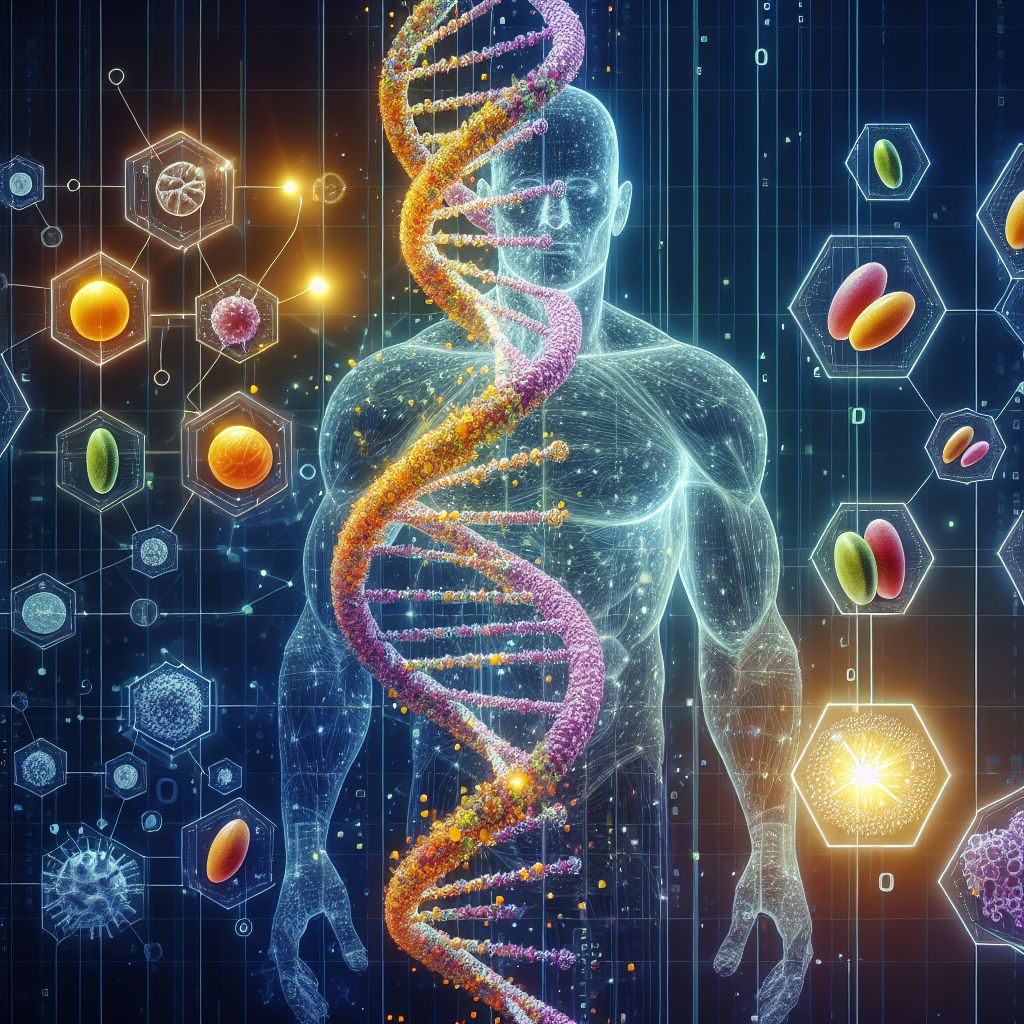Human Design and Vitamins: Personalized Health

Discover your unique Human Design and unlock the secrets to personalized health with our tailored vitamin plans. Start your journey to vibrant vitality today. Click here to learn more.
Exploring the Connection Between Human Design and Vitamin Intake
Human Design, a system that combines astrology, the I Ching, Kabbalah, Hindu-Brahmin chakra model, and quantum physics, is increasingly being used to understand individuality at a deeper level. It provides a blueprint of our unique genetic makeup, offering insights into our strengths, weaknesses, and potential health issues. Recently, there has been a growing interest in the connection between Human Design and vitamin intake, with the aim of achieving personalized health.
The concept of personalized health is not new. It is based on the understanding that each individual is unique, and therefore, their health needs are also unique. This is where Human Design comes into play. By understanding our unique design, we can make more informed decisions about our health, including our vitamin intake.
Vitamins are essential nutrients that our bodies need in small amounts to function properly. They play crucial roles in various bodily functions, from boosting the immune system to supporting bone health. However, not everyone requires the same amount of each vitamin. Factors such as age, gender, lifestyle, and genetic makeup can influence our vitamin needs. This is where the connection between Human Design and vitamin intake becomes apparent.
Human Design can provide insights into our genetic makeup, which can help us understand our individual vitamin needs. For instance, some people may have a genetic predisposition to absorb certain vitamins more efficiently than others. Others may have a higher requirement for certain vitamins due to their unique genetic makeup. By understanding these genetic factors, we can tailor our vitamin intake to meet our individual needs.
Moreover, Human Design can also provide insights into our lifestyle and health habits, which can further influence our vitamin needs. For example, individuals with a defined Sacral Center in their Human Design chart are believed to have a high energy output. They may require higher amounts of vitamins that support energy production, such as B-vitamins. On the other hand, individuals with an undefined Sacral Center may have a more inconsistent energy output and may benefit from a more balanced vitamin intake.
Furthermore, Human Design can also shed light on potential health issues that we may be predisposed to. For instance, individuals with a defined Spleen Center are believed to have a strong immune system, but they may also be prone to overworking their immune system. They may benefit from vitamins that support immune health, such as vitamin C and zinc.
In conclusion, the connection between Human Design and vitamin intake offers a promising avenue for personalized health. By understanding our unique design, we can make more informed decisions about our vitamin intake, which can help us achieve optimal health. However, it’s important to remember that while Human Design can provide valuable insights, it should not replace professional medical advice. Always consult with a healthcare professional before making any changes to your vitamin intake or health regimen.
Personalized Health: Tailoring Vitamin Regimens to Your Human Design

Human Design, a system that combines astrology, the I Ching, Kabbalah, Hindu-Brahmin chakra model, and quantum physics, is increasingly being used to understand individual uniqueness and to guide decisions about health and wellness. This system provides a blueprint of our genetic makeup, revealing our strengths, weaknesses, and potential health issues. As such, it is becoming a valuable tool in the field of personalized health, particularly in tailoring vitamin regimens to individual needs.
The concept of personalized health is not new. It is based on the understanding that each person is unique, and therefore, their health needs are also unique. This is where Human Design comes in. By understanding our unique design, we can make more informed decisions about our health, including what vitamins and supplements we should take.
The Human Design system categorizes people into four types: Manifestors, Generators, Projectors, and Reflectors. Each type has its own unique characteristics and health needs. For instance, Manifestors are natural initiators with a lot of energy and may benefit from vitamins that support energy production, such as B-vitamins. Generators, on the other hand, are the workhorses of society and may need vitamins that support muscle function and recovery, such as magnesium and vitamin D.
Projectors, who are natural guides and need more rest than other types, may benefit from vitamins that support relaxation and sleep, such as melatonin. Lastly, Reflectors, who are sensitive to their environment, may need vitamins that support immune function and detoxification, such as vitamin C and selenium.
However, it’s not just about the type. The Human Design system also provides information about specific centers in our body, similar to the chakra system in Hindu-Brahmin tradition. These centers are associated with different aspects of our physical, mental, and emotional health. For instance, the Throat Center is associated with communication and metabolic function. If this center is defined in your Human Design, you may benefit from vitamins that support thyroid function, such as iodine and selenium.
The Human Design system also provides information about our dietary regimen, which can guide us in choosing the right vitamins. For instance, some people are designed to eat in a calm environment, while others need to eat in a busy, stimulating environment. This can affect our digestion and absorption of nutrients, and therefore, our vitamin needs.
In conclusion, the Human Design system provides a wealth of information that can guide us in personalizing our health, including our vitamin regimen. By understanding our unique design, we can make more informed decisions about what vitamins and supplements we should take, and when and how we should take them. This can help us optimize our health and wellness, and prevent potential health issues.
However, it’s important to remember that while Human Design can provide valuable insights, it’s not a substitute for professional medical advice. Always consult with a healthcare professional before starting any new vitamin regimen. Personalized health is about taking charge of our health, but it’s also about working in partnership with healthcare professionals to ensure that our decisions are safe and effective.
The Role of Human Design in Determining Optimal Vitamin Consumption
Human Design, a system that combines astrology, the I Ching, Kabbalah, Hindu-Brahmanic system, and quantum physics, is increasingly being recognized for its potential in personalized health. It offers a unique perspective on individuality, providing a blueprint of our genetic makeup. This blueprint, or BodyGraph, can be used to understand our strengths, weaknesses, and potential health issues. Recently, there has been a growing interest in the role of Human Design in determining optimal vitamin consumption.
The Human Design system categorizes individuals into four types: Manifestors, Generators, Projectors, and Reflectors. Each type has a unique way of interacting with the world, and by extension, different nutritional needs. For instance, Manifestors are known for their initiating energy and may require vitamins that support their active lifestyle, such as B-vitamins for energy production and muscle function. On the other hand, Reflectors, who are sensitive to their environment, might benefit from vitamins that strengthen their immune system, like Vitamin C and E.
Moreover, the BodyGraph in Human Design also highlights the Centers, which are specific areas in our body that correspond to certain functions or traits. For example, the Throat Center is associated with communication and action, while the Solar Plexus Center is linked to emotions and desires. By understanding the defined and undefined Centers in our BodyGraph, we can identify potential health issues and address them through targeted vitamin consumption.
For instance, an individual with an undefined Throat Center might struggle with communication and may experience frequent throat infections or thyroid issues. In this case, vitamins that support thyroid health, such as iodine and selenium, could be beneficial. Similarly, someone with a defined Solar Plexus Center, indicating strong emotional energy, might benefit from B-vitamins, which are known to support mood regulation and stress management.
However, it’s important to note that while Human Design can provide valuable insights into our health, it should not replace professional medical advice. It’s always recommended to consult with a healthcare provider before starting any new vitamin regimen.
Furthermore, the concept of personalized health goes beyond just vitamin consumption. It also includes understanding our unique dietary needs, exercise routines, sleep patterns, and stress management techniques. Human Design can serve as a tool to guide us in these areas, helping us to live in alignment with our true nature and achieve optimal health.
In conclusion, Human Design offers a unique approach to personalized health, particularly in determining optimal vitamin consumption. By understanding our type and Centers, we can tailor our vitamin intake to support our specific needs and potential health issues. However, it’s crucial to remember that this system is just one piece of the puzzle. A holistic approach to health, which includes a balanced diet, regular exercise, adequate sleep, and stress management, is still essential. And as always, professional medical advice should be sought before making any significant changes to our health regimen.
As we continue to explore the intersection of Human Design and health, it’s exciting to see how this system can contribute to a more personalized and effective approach to wellness. By embracing our uniqueness, we can take proactive steps towards achieving optimal health and well-being.